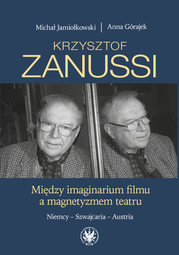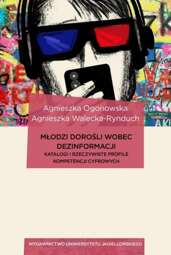Information about a product
| Edition: | 1 |
| Place and year of publication: | Warszawa 2023 |
| Publication language: | angielski |
| ISBN/ISSN: | 978-83-235-5880-4 |
| EAN: | 9788323558804 |
| Number of page: | 202 |
| Method of publication: | PDF |
| Size of the file: | 13,1 MB |
| Publication type: | Praca naukowa , Open access |
| DOI: | https://doi.org/10.31338/uw.9788323558804 |
One day, according to the Ancient Greek author Xenophon, the hero Hercules “went out to a quiet place and sat, pondering”. This book explores what happened here and how and why it can resonate with autistic young people. The book presents a set of ten lessons, each dealing with an aspect of what happened when Hercules entered the quiet place, met two women (or goddesses, or personifications…) and was tasked to make a choice between two paths, literal and metaphorical. The lessons deal, too, with particular dimensions of autism, including: communicating, emotions, decision-making, sensory experiences, planning and interests. This pathbreaking book should be of particular interest to professionals and practitioners looking to utilize the appeal of mythology in their work with autistic children and academics in areas such as education, Classics and literature interested in the experiential application of their subject.
The publication is licensed under the Creative Commons Attribution-ShareAlike 3.0 Poland license (CC BY 3.0 PL) (full license available at: https://creativecommons.org/licenses/by/3.0/legalcode).
Keywords: The Choice of Hercules, autism, Classical Antiquity, mythology, inclusive education.
See other publications from the series: Our Mythical Childhood »
The publication is licensed under the Creative Commons Attribution-ShareAlike 3.0 Poland license (CC BY 3.0 PL) (full license available at: https://creativecommons.org/licenses/by/3.0/legalcode).
Keywords: The Choice of Hercules, autism, Classical Antiquity, mythology, inclusive education.
See other publications from the series: Our Mythical Childhood »
[Susan Deacy] is a leading expert in this field. […] the book offers an original and valuable contribution to the growing field of story work for students with special educational needs. […] Professor Deacy is a classical expert, whose knowledge is lightly worn and beautifully conveyed in lucid prose.
From the editorial review, Nicola Grove, Learning Disabilities specialist and author, The Tizard Centre, University of Kent
[T]his work certainly fills a gap. It represents a really imaginative take on working creatively with autistic pupils and this is really refreshing. […] it has practical application for imaginative teachers, parents and possibly therapists.
From the editorial review, Nicola Martin, Professor of Social Justice and Inclusive Education, London South Bank University
This project is so special. It means a lot to me that there are people supporting (but maybe it’s not the right word) – better: LETTING autistic children know the classical heritage on their terms – and find ways to express their inner worlds on their terms. This is making the world a more colourful and creative place.
A backstage statement on Susan Deacy’s work by a University of Oxford PhD student interested in neurodiversity, Diversifying Outreach event, UK
Prof. Susan Deacy […] has conducted numerous workshops for children at schools with autism bases. Her contacts with pupils, their teachers, parents, and tutors contributed further to enhancing the dialogic background of this book. If you lend an ear, you will hear the polyphony and discover an aural memory of their voices. Prof. Deacy follows them with utmost respect in developing a unique research approach that could be called the Humanities of Empathy – the future of our discipline. […] Prof. Deacy focuses on autistic children, but I have no doubt that all her readers, irrespective of their age and life situation, can profit from her reflections (inclusivity in practice!) and learn with Hercules how to cope with the path “per aspera ad astra” – “through hardships to the stars”.
Katarzyna Marciniak, University of Warsaw, Editor of the Series
From the editorial review, Nicola Grove, Learning Disabilities specialist and author, The Tizard Centre, University of Kent
[T]his work certainly fills a gap. It represents a really imaginative take on working creatively with autistic pupils and this is really refreshing. […] it has practical application for imaginative teachers, parents and possibly therapists.
From the editorial review, Nicola Martin, Professor of Social Justice and Inclusive Education, London South Bank University
This project is so special. It means a lot to me that there are people supporting (but maybe it’s not the right word) – better: LETTING autistic children know the classical heritage on their terms – and find ways to express their inner worlds on their terms. This is making the world a more colourful and creative place.
A backstage statement on Susan Deacy’s work by a University of Oxford PhD student interested in neurodiversity, Diversifying Outreach event, UK
Prof. Susan Deacy […] has conducted numerous workshops for children at schools with autism bases. Her contacts with pupils, their teachers, parents, and tutors contributed further to enhancing the dialogic background of this book. If you lend an ear, you will hear the polyphony and discover an aural memory of their voices. Prof. Deacy follows them with utmost respect in developing a unique research approach that could be called the Humanities of Empathy – the future of our discipline. […] Prof. Deacy focuses on autistic children, but I have no doubt that all her readers, irrespective of their age and life situation, can profit from her reflections (inclusivity in practice!) and learn with Hercules how to cope with the path “per aspera ad astra” – “through hardships to the stars”.
Katarzyna Marciniak, University of Warsaw, Editor of the Series
- What Would Hercules Do_contents.pdf Download
- What Would Hercules Do_foreword series editor.pdf Download
- What Would Hercules Do_author.pdf Download
- What Would Hercules Do_illustrator.pdf Download
- What Would Hercules Do_foreword acknowledgements author.pdf Download
- What Would Hercules Do_sample.pdf Download
- What Would Hercules Do_series.pdf Download
Zobacz również

Update Required
To play the media you will need to either update your browser to a recent version or update your Flash plugin.
















